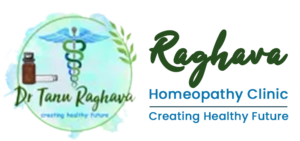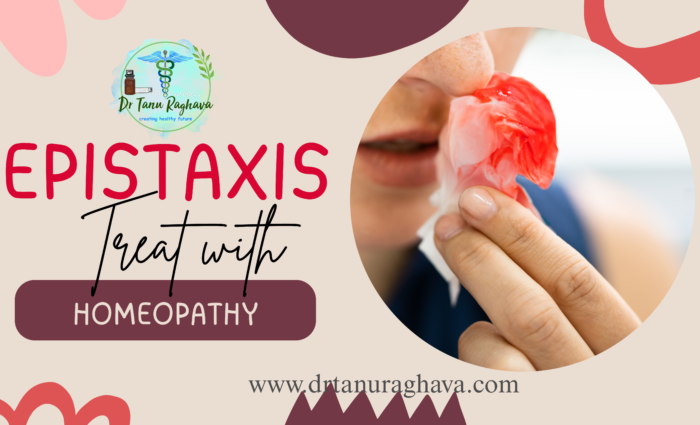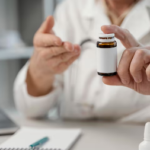Introduction
Table of Contents
ToggleEpistaxis, or nosebleed, is a common condition that can range from a mild inconvenience to a severe medical concern. As a Homeopathic Physician and Nutritional Counselor, Dr. Tanu Raghava emphasizes the importance of understanding its root causes and managing it holistically through homeopathy, diet, and lifestyle changes. This blog provides an in-depth look into the causes, symptoms, homeopathic remedies, and lifestyle practices that support healing and prevention.
The Culprit Behind Epistaxis
The inner lining of the nose is rich in blood vessels, making it vulnerable to bleeding when irritated or damaged. Even minor trauma or environmental changes can rupture these vessels, resulting in bleeding.
Causes of Epistaxis
- Dry air or sudden weather changes
- Nasal trauma or frequent nose picking
- Upper respiratory infections or allergic rhinitis
- Hypertension
- Blood clotting disorders
- Medications such as anticoagulants
- Nutritional deficiencies (Vitamin C, K, iron)
Types of Nosebleeds
- Anterior Epistaxis: Originates from the front of the nose; more common and less serious
- Posterior Epistaxis: Arises from deeper parts of the nose; can be more severe and harder to control
Symptoms Associated with Epistaxis
- Sudden bleeding from one or both nostrils
- Dizziness or weakness
- Nasal congestion or irritation
- Metallic taste in the mouth
- Headache or facial pressure
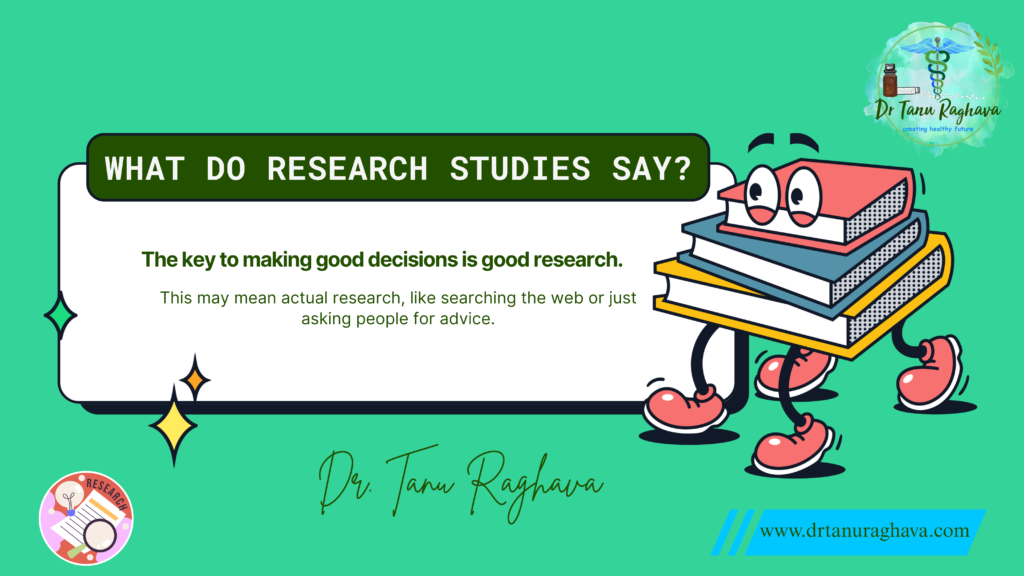
Scientific Evidence Supporting Homeopathy in Epistaxis
Research in journals like Homeopathy and Complementary Therapies in Clinical Practice highlights the effectiveness of individualized homeopathic treatments in cases of recurrent nosebleeds. Clinical case reports document reduced frequency and intensity of epistaxis episodes after homeopathic interventions.
Role of Homeopathy in Treating Epistaxis
Dr. Tanu Raghava advocates for the use of homeopathy as a safe, gentle, and effective treatment modality. Homeopathic medicines act at the constitutional level, correcting the underlying imbalances and tendencies that lead to recurrent nosebleeds. Unlike conventional treatments that may temporarily stop the bleeding, homeopathy aims at long-term resolution by strengthening the body’s natural defenses.
Homeopathic Medicines
1. Hamamelis Virginica
Highlighted Symptom: Passive, dark, venous bleeding from the nose.
- Weakness and exhaustion post-bleed
- Hemorrhages in varicose patients
- Bleeding worsens with motion or exertion
- No pain, only oozing
2. Millifolium (Achillea millefolium)
Highlighted Symptom: Profuse, bright red bleeding without trauma.
- Sudden nosebleeds in anemic individuals
- Bleeding after blowing nose
- Suitable for bleeding disorders
- Relief after cold compress
3. Phosphorus
Highlighted Symptom: Frequent nosebleeds in tall, thin individuals.
- Worse in the morning and from exertion
- Bleeding gums and blood-streaked sputum
- Craves cold drinks
- Sensitive and emotionally expressive patient
Other Important Remedies:
- Nosebleeds with nausea and paleness
- Bright red blood
- Worse in warm room
- Associated chest congestion
- Nosebleed after trauma or injury
- Bruised feeling all over
- Bleeding worsens with touch
- Useful in post-surgical bleeding
- Recurrent bleeding with marked weakness
- Dizziness after nosebleed
- Sensitive to touch and draft
- Ideal for persons with a history of hemorrhage
- Early stages of infection or inflammation
- Bright red blood
- Alternating chills and heat
- Suitable for children

Importance of Correct Diet in Epistaxis
Dr. Tanu Raghava stresses that nutrition plays a vital role in controlling and preventing recurrent nosebleeds. Certain nutrients help strengthen blood vessels and prevent capillary fragility.
Foods to Eat:
- Fruits: Oranges, Amla, Kiwi, Papaya (rich in Vitamin C)
- Vegetables: Spinach, Carrots, Beetroot, Broccoli (rich in iron and folate)
- Pulses: Moong dal, Toor dal (easy to digest, rich in iron)
- Nuts & Seeds: Walnuts, Flax seeds, Sesame seeds, Almonds (soaked)
- Other: Jaggery, dates, lemon water, homemade soups, coconut water
Foods to Avoid:
- Excessively hot or spicy food
- Deep-fried and processed snacks
- Caffeinated beverages
- Alcohol and smoking
- Cold drinks and ice creams (dry out nasal membranes)
- Preserved and salty foods (may raise blood pressure)
Do's and Don'ts: Lifestyle Changes
Do’s:
- Use a humidifier during dry seasons
- Apply coconut oil or ghee inside nostrils to keep them moist
- Stay hydrated with lukewarm water
- Practice gentle breathing exercises
- Get routine blood pressure checks
Don’ts:
- Avoid excessive nose blowing or scratching
- Don’t ignore frequent nosebleeds
- Avoid exposure to extreme temperatures
- Refrain from self-medicating with nasal sprays
- Avoid high-stress situations without coping strategies
Top 3 Yoga Exercises for Nosebleed Prevention
1. Sheetali Pranayama (Cooling Breath)
Steps:
- Sit in a cross-legged posture
- Roll your tongue and inhale through it
- Close the mouth and exhale through the nose
- Repeat for 5–10 minutes
2. Viparita Karani (Legs-Up-the-Wall Pose)
Steps:
- Lie down near a wall and raise your legs up
- Keep your arms relaxed at sides
- Stay in the pose for 10–15 minutes
3. Shavasana (Corpse Pose)
Steps:
- Lie flat on your back
- Close eyes, keep legs and arms slightly apart
- Focus on breathing and relax each muscle group
- Practice for 10–15 minutes
Bonus Tip
Keep a small piece of cotton dipped in rose water in the nostril during dry seasons to prevent capillary dryness and spontaneous bleeding.
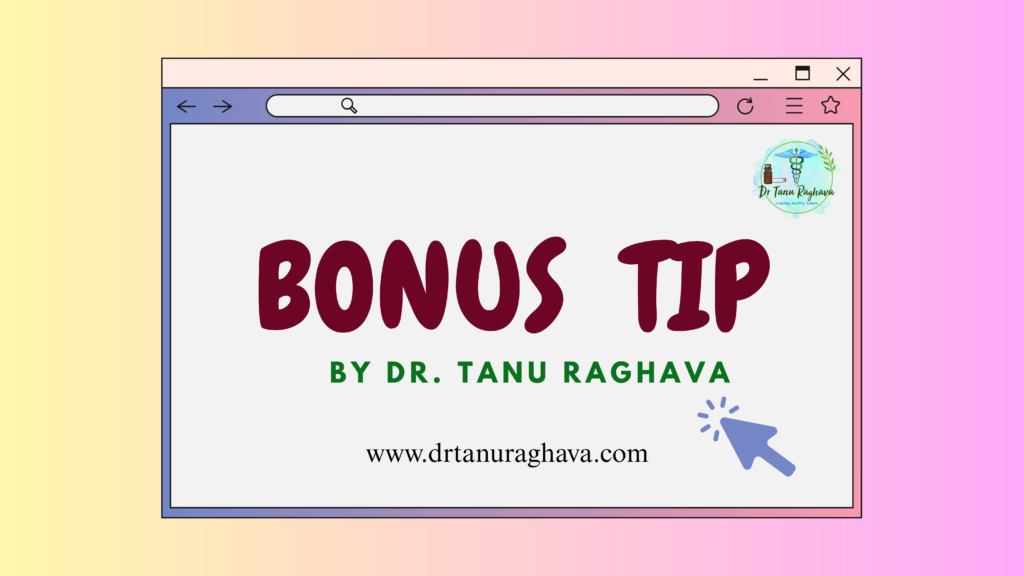
Conclusion
Epistaxis can be effectively managed and prevented with a combination of homeopathy, a nourishing diet, and healthy lifestyle practices. With the right care and an individualized approach under the guidance of Dr. Tanu Raghava, lasting relief is possible without side effects. Always remember, timely attention and holistic treatment are key.
FAQs
Q1. Can homeopathy prevent recurrent nosebleeds?
Ans: Yes, homeopathy treats the root cause and can effectively prevent recurrent episodes.
Q2. Is epistaxis a serious condition?
Ans: Usually not, but frequent or heavy bleeding may indicate an underlying issue and requires medical attention.
Q3. What are the best natural ways to stop a nosebleed?
Ans: Pinching the nostrils, cold compress on the nose, and applying ghee or oil inside the nostrils can help.
Q4. Can children be treated with homeopathy for nosebleeds?
Ans: Absolutely. Homeopathy is gentle and safe for children.
Q5. What nutrients are important for preventing epistaxis?
Ans: Vitamin C, Vitamin K, and iron are essential for strong capillaries and preventing bleeding.
